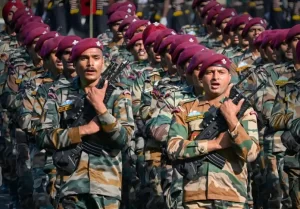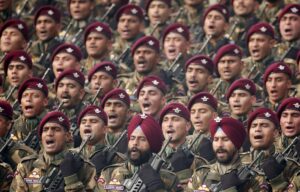Introduction
Military operations are crucial components of national defense strategies, aimed at achieving specific objectives to ensure the security and sovereignty of a nation. Aspiring military personnel need to have a comprehensive understanding of past and present military operations to effectively contribute to future endeavors. In 2024, several military operations around the world have significant implications for global security. This article aims to provide an overview of essential military operations for aspirants to know about in 2024, covering various regions and aspects of modern warfare.
Operation Inherent Resolve (OIR)
Operation Inherent Resolve is a multinational coalition effort led by the United States and its allies to combat the threat posed by the Islamic State of Iraq and Syria (ISIS) and other terrorist organizations in the Middle East. Since its inception in 2014, OIR has aimed to degrade and ultimately defeat ISIS through a combination of airstrikes, special operations, and support for local partner forces.
In 2024, OIR continues to be active in Iraq and Syria, although its focus has shifted towards consolidating territorial gains made against ISIS and supporting stabilization efforts in liberated areas. Aspirants should understand the complexities of counterinsurgency operations, coalition dynamics, and the importance of building partner capacity in addressing asymmetric threats like terrorism.
Operation Freedom’s Sentinel (OFS)
Operation Freedom’s Sentinel is the United States’ counterterrorism mission in Afghanistan, launched in 2015 following the conclusion of Operation Enduring Freedom. While the initial objective was to disrupt and dismantle terrorist networks, OFS has evolved to support the Afghan government in its efforts to maintain security and stability.
In 2024, OFS remains active amid ongoing peace negotiations between the Afghan government and the Taliban. As U.S. and coalition forces continue to draw down their presence, aspirants should familiarize themselves with the challenges of nation-building, counterinsurgency operations, and the role of diplomacy in resolving protracted conflicts.
Operation Barkhane
Operation Barkhane is a French-led military operation in the Sahel region of Africa, aimed at combating jihadist groups and supporting regional partners in their efforts to restore stability. Launched in 2014, Barkhane operates across five countries: Burkina Faso, Chad, Mali, Mauritania, and Niger.
In 2024, Operation Barkhane faces persistent challenges from groups affiliated with al-Qaeda and ISIS, as well as intercommunal violence and political instability. Aspirants should study the complexities of asymmetric warfare, transnational threats, and the importance of multinational cooperation in addressing security challenges in the Sahel.
Operation Atlantic Resolve
Operation Atlantic Resolve is a NATO-led effort to enhance the alliance’s collective defense and deterrence posture in response to Russian aggression in Eastern Europe. Since 2014, Atlantic Resolve has involved rotational deployments of U.S. and allied forces to the Baltic states, Poland, Romania, and other NATO member countries.
In 2024, Operation Atlantic Resolve remains critical amid ongoing tensions between NATO and Russia, exacerbated by issues such as the conflict in Ukraine and Moscow’s military buildup near the alliance’s eastern flank. Aspirants should grasp the principles of deterrence, collective defense, and the implications of hybrid warfare in the Euro-Atlantic region.
Operation Okra
Operation Okra is Australia’s contribution to the international coalition against ISIS, primarily focused on air support and training for Iraqi security forces. Since 2014, Australian Defence Force personnel have conducted airstrikes and deployed special forces to Iraq as part of the broader effort to degrade and defeat ISIS.
In 2024, Operation Okra continues as Australia maintains its commitment to the coalition despite the territorial defeat of ISIS in Iraq and Syria. Aspirants should examine the role of middle powers in coalition operations, the importance of air power in contemporary warfare, and the challenges of maintaining military readiness in a volatile region.
Operation Resolute Support
Operation Resolute Support is the NATO-led mission to train, advise, and assist the Afghan National Defense and Security Forces (ANDSF) following the conclusion of combat operations in 2014. Resolute Support aims to build the capacity and capability of Afghan security forces to address internal security threats and prevent the resurgence of terrorist groups.
In 2024, Operation Resolute Support remains critical as Afghanistan faces persistent challenges from the Taliban insurgency, political instability, and socioeconomic issues. Aspirants should analyze the complexities of security sector reform, counterinsurgency operations, and the prospects for peace and stability in Afghanistan.
Operation Sentinel
Operation Sentinel is a French military operation launched in response to the terrorist attacks in Paris in 2015. It involves the deployment of thousands of troops to protect key sites and provide security in urban areas across France, particularly in the wake of heightened terrorist threats.
In 2024, Operation Sentinel continues as France grapples with the persistent risk of terrorism, both domestically and internationally. Aspirants should understand the importance of homeland security, counterterrorism measures, and the integration of military and law enforcement capabilities in safeguarding civilian populations.
Conclusion
In conclusion, aspiring military personnel must familiarize themselves with essential military operations in 2024 to develop a comprehensive understanding of contemporary security challenges and operational environments. From counterterrorism efforts in the Middle East to deterrence measures in Eastern Europe and stabilization missions in Africa, these operations exemplify the diverse range of threats and responses shaping modern warfare. By studying the objectives, strategies, and outcomes of these operations, aspirants can enhance their readiness to contribute effectively to future military endeavors and safeguard national interests in an ever-changing global landscape.
FAQs:
What defines a military operation?
A military operation is a planned and coordinated activity conducted by armed forces to achieve specific objectives, such as defending territory, neutralizing threats, supporting allies, or providing humanitarian assistance. These operations can vary in scale, scope, and complexity, ranging from small-scale reconnaissance missions to large-scale combat deployments.
How are military operations planned and executed?
Military operations undergo meticulous planning, involving intelligence gathering, strategic analysis, and operational planning. Military planners consider factors such as objectives, terrain, enemy capabilities, logistics, and political considerations. Execution involves deploying forces, coordinating actions, adapting to dynamic situations, and achieving desired outcomes.
What are the different types of military operations?
Military operations encompass a wide range of activities, including:
Combat operations: Direct engagement with enemy forces, such as offensive maneuvers, defensive actions, and counterinsurgency operations.
Peacekeeping operations: Maintaining peace and stability in conflict zones, often involving multinational forces deployed under United Nations or regional mandates.
Humanitarian operations: Providing aid, relief, and support to populations affected by natural disasters, conflicts, or humanitarian crises.
Counterterrorism operations: Combating terrorist threats through intelligence gathering, targeted strikes, and law enforcement actions.
Special operations: Covert or unconventional missions conducted by elite units for reconnaissance, sabotage, hostage rescue, or counterterrorism.
What are some notable military operations in 2024?
In 2024, several military operations have been significant in shaping global security dynamics, including:
Operation Inherent Resolve: The ongoing multinational campaign to defeat the Islamic State of Iraq and Syria (ISIS) in Iraq and Syria.
Operation Freedom’s Sentinel: The United States-led mission to combat terrorism and support Afghan security forces in Afghanistan following the withdrawal of most U.S. troops.
Operation Barkhane: France’s counterterrorism operation in the Sahel region of Africa, aimed at combating jihadist groups and stabilizing the region.
NATO Enhanced Forward Presence: NATO’s deployment of multinational battlegroups to the Baltic states and Poland to deter Russian aggression and reassure allies in Eastern Europe.
How do military operations impact international relations?
Military operations can have significant geopolitical implications, shaping alliances, security dynamics, and diplomatic relations. They can influence perceptions of power, credibility, and resolve among nations, as well as impact regional stability and conflict resolution efforts. Effective coordination and cooperation between military forces, diplomatic efforts, and international organizations are essential for managing the consequences of military operations and promoting peace and security.
What role do emerging technologies play in military operations?
Emerging technologies, such as artificial intelligence, cyber capabilities, unmanned aerial vehicles (UAVs), and autonomous systems, are increasingly integrated into military operations. These technologies offer enhanced situational awareness, precision targeting, and operational efficiency but also pose new challenges, including cybersecurity threats, ethical considerations, and arms control issues. Military forces must adapt to the evolving technological landscape to maintain a competitive edge and address emerging threats effectively.










